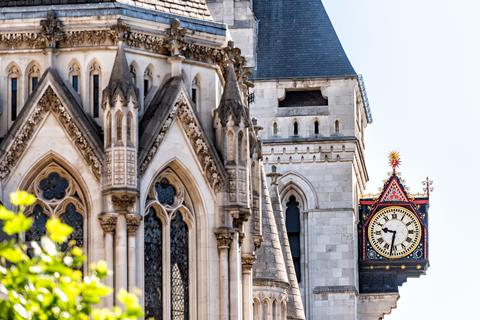Lawyers have escaped contempt proceedings over the use of fake citations - but the High Court will be referring them to their regulators.
Dame Victoria Sharp, president of the King’s Bench Division, and Mr Justice Johnson heard two cases referred to them because of ‘actual or suspected use’ of generative AI tools used by lawyers to produce written legal arguments or witness statements.
The judgment handed down today in Frederick Ayinde v The London Borough of Haringey, states: ‘Artificial intelligence is a tool that carries with it risks as well as opportunities. Its use must take place therefore with an appropriate degree of oversight, and within a regulatory framework that ensures compliance with well-established professional and ethical standards if public confidence in the administration of justice is to be maintained.
‘Those who use artificial intelligence to conduct legal research notwithstanding these risks have a professional duty therefore to check the accuracy of such research by reference to authoritative sources, before using it in the course of their professional work (to advise clients or before a court, for example). There are serious implications for the administration of justice and public confidence in the justice system if artificial intelligence is misused.’
Referring to Hamad Al-Haroun v Qatar National Bank, in which Abid Hussain of Manchester-based Primus Solicitors, acting for Al-Haroun, admitted he relied on legal research conducted by his client without verifying the authorities, Sharp said there had been a ‘lamentable failure to comply with the basic requirement to check the accuracy of material that is put before the court’.
She added: ‘A lawyer is not entitled to rely on their lay client for the accuracy of citations of authority or quotations that are contained in documents put before the court by the lawyer. It is the lawyer’s professional responsibility to ensure the accuracy of such material. We are satisfied that Mr Hussain did not realise the true position.’
The judgment said the threshold for the initiation on contempt proceedings was not met and, although Hussain had referred himself to the Solicitors Regulation Authority, the High Court would also make a referral.

Read more
In the Ayinde case, Sarah Forey, instructed by Haringey Law Centre, was found to have cited false authorities while a pupil barrister. She had used AI when preparing her list of cases or the ground for judicial review.
The judgment said: ‘On the material before us, there seem to be two possible scenarios. One is that Ms Forey deliberately included fake citations in her written work. That would be a clear contempt of court. The other is that she did use generative artificial intelligence tools to produce her list of cases and/or to draft parts of the grounds of claim. In that event, her denial (in a witness statement supported by a statement of truth) is untruthful. Again, that would amount to a contempt. In all the circumstances, we consider that the threshold for initiating contempt proceedings is met.’
The judge said it would not however initiate contempt proceedings against Forey or refer the case to law officers for a number of reasons, including that she is an ‘extremely junior lawyer'. Her conduct will be the subject of an investigation by the bar regulator, the judges said. ‘This court’s decision not to initiate contempt proceedings in respect of Ms Forey is not a precedent. Lawyers who do not comply with their professional obligations in this respect risk severe sanction,’ Dame Sharp added.
Forey had self-referred to the Bar Standards Board and was referred by another judge. The High Court will also be referring her to the BSB, the judgment said.
The judgment said there ‘was no basis to suspect’ Victor Amadigwe, a solicitor at the Haringey Law Centre, had deliberately caused false material to be put before the court and ‘there is no question of initiating contempt proceedings in respect of him’. It noted that the steps taken by Amadigwe after he was put on notice as to what had happened were ‘inadequate’ and the court would refer the matter to the SRA.
The judgment said the cases highlighted that guidance ‘promulgated by the regulatory bodies’ was insufficient on its own to address the misuse of AI.
It added: ‘More needs to be done to ensure that the guidance is followed and lawyers comply with their duties to the court. A copy of this judgment will be sent to the Bar Council and the Law Society, and to the Council of the Inns of Court. We invite them to consider as a matter of urgency what further steps they should now take in the light of this judgment.’
Law Society chief executive Ian Jeffery commented: 'This High Court judgment lays bare the dangers of using AI in legal work. We need to ensure the risks are properly addressed. The Law Society of England and Wales has already provided guidance and resources to the legal profession. We will continue to develop and expand them as part of our wider programme of supporting members with technology adoption.'
This article is now closed for comment.






























6 Readers' comments